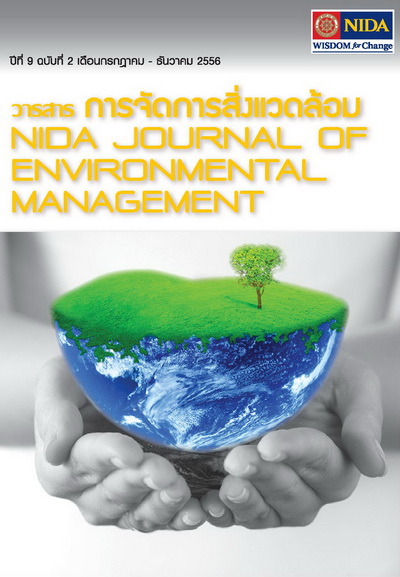การเสริมสร้างสมรรถนะอาสาสมัครสาธารณสุขในการจัดการขยะ ที่สอดคล้องกับภูมิสังคมของชุมชนชาวเขาอย่างยั่งยืนในพื้นที่ ตำบลป่ากลาง อำเภอปัว จังหวัดน่าน
บทคัดย่อ
บทคัดย่อ
การวิจัยครั้งนี้มีวัตถุประสงค์เพื่อศึกษาภูมิสังคม สภาพ และสถานการณ์การจัดการขยะในชุมชนชาวเขา และเพื่อเสริมสร้างสมรรถนะอาสาสมัครสาธารณสุขในการจัดการขยะที่สอดคล้องกับ ภูมิสังคมของชุมชนชาวเขาอย่างยั่งยืนในพื้นที่ตำบลป่ากลาง อำเภอปัว จังหวัดน่าน ประชากรในการวิจัยได้แก่ อาสาสมัครสาธารณสุข จำนวน 92 คน เครื่องมือที่ใช้ในการวิจัยคือ แบบสอบถาม การสนทนากลุ่ม การสัมภาษณ์เชิงลึก การสังเกตและการบันทึกภาคสนาม และการอภิปรายกลุ่ม ผลการวิจัยพบว่า พื้นที่วิจัยประกอบด้วยชาวเขาเผ่าม้ง เผ่าเมี่ยน และเผ่าลัวะ จำนวน 11,043 คน มีขยะเกิดขึ้นในพื้นที่ 7.06 ตัน/วัน โดยมีสาเหตุสำคัญจากวิถีชีวิตที่เริ่มเลียนแบบชนพื้นเมือง การขาดความรู้ในการจัดการ และการมีทัศนคติเชิงลบต่อการจัดการขยะ รวมถึงวิธีการจัดการขยะที่ขาดประสิทธิภาพ ทำให้มีขยะตกค้างในพื้นที่จนส่งผลกระทบต่อสิ่งแวดล้อมและสุขภาพของประชาชน และผลจากการเสริมสร้างสมรรถนะของอาสาสมัครสาธารณสุขเพื่อให้เป็นแกนนำการ จัดการขยะในชุมชน พบว่า อาสาสมัครสาธารณสุขตำบลป่ากลางมีผลสัมฤทธิ์ด้านความรู้ ด้านทักษะ และด้านพฤตินิสัย หลังการเสริมสร้างสมรรถนะสูงกว่าก่อนการเสริมสร้างสมรรถนะอย่างมีนัยสำคัญ ทางสถิติที่ระดับ 0.05 และสามารถทำตนเป็นต้นแบบและเป็นแกนนำในการชักชวนให้ประชาชนเข้ามามีส่วนร่วม ในการจัดการขยะในครัวเรือนและชุมชนได้อย่างเป็นรูปธรรม
คำสำคัญ: การเสริมสร้างสมรรถนะ; การจัดการขยะ; ภูมิสังคมของชุมชนชาวเขา
Abstract
This research aimed to study the management and handling of waste appropriate for the geo-sociological background of the hill tribes in Paklang Sub-District, Pua District , Nan Province, Thailand, and to strengthen the competency of the village health volunteers in terms of waste management. The samples were 92 village health volunteers. The instruments for the study were a questionnaire, focus group discussion, in-depth interview, observation, and field notes, and group discussion . The research findings showed that there were 3 groups of hill tribes :the Mong tribe, the Mien tribe, and the Lua tribe. The subjects were 11,043 people. The waste produced per day was 7.06 tons. The hill tribes did not know how to recycle their waste and their attitude towards waste management was negative. Additionally, the hill tribes did not exhibit good efficiency in the management of their waste, so there was a lot of waste in their living areas, causing pollution and bad health for the people. The results of the competency strengthening of the village health volunteers showed that their knowledge , skills, and traits of the mainstay waste management were effective. Having used the training process, the village health volunteers will have greater achievement in knowledge, skills, and traits at a statistical significance level of 0.05. Finally they can be the leaders of the community in terms of participation in efficient waste management.
Keywords: Competency Strengthening; Waste Management; Geo-sociological Hill Tribes



